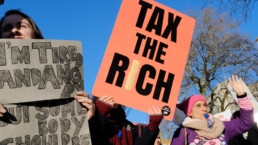Policies to tax the wealthy are both good policy and good politics. They are wildly popular, with polls showing at least 70% of Americans support tax-the-top initiatives, including a majority (54%) of Republican voters.
By Omar Ocampo and Chuck Collins, The Messenger
The Biden administration successfully negotiated a deal — soon to be passed in Congress — that will allow the federal government to borrow the money it needs to meet its fiscal obligations over the next couple of years.

Despite avoiding a massive U.S. debt default that would have reverberated across the global economy, progressives and members of the Congressional Progressive Caucus are not exactly in a celebratory mood, and with good reason.
Some of the provisions contained in the debt ceiling bill, known euphemistically as the Fiscal Responsibility Act of 2023, follow the logic and politics of austerity. Programs designed to help the working class and contribute to our common good are effectively cut. Meanwhile, defense spending is exempt from any freezes despite the Pentagon’s inability to account for billions of dollars in their annual audits.
Republican lawmakers often tell us that the purpose of budget cuts and more stringent requirements to access social benefits is to reduce waste and the federal deficit. But if this were truly their goal, they have an unusual way of achieving it since they adamantly refuse to consider raising new taxes on the ultra-wealthy.
Recent Posts
What To Do When You See ICE In Your Neighborhood
July 14, 2025
Take Action Now How can you deter the Trump administration’s immigrant deportation machine when it pops up in your community? Follow these…
ICE Campaign Of Violence Will Lead To More Deaths
July 14, 2025
Take Action Now Jaime Alanis’s death shows the horrific consequences of a secret police force behaving with utter impunity.By Natasha Lennard, The…
Hague Group: “Concrete Measures” or Sack of Cement? Will It Move to Sanctions, Peace Force and Ensuring Aid to Gaza?
July 13, 2025
Take Action Now Will the meeting in Colombia be a coalescence of global opinion driving states to just action — or just more rhetoric from various…
Why Are Democratic Lawmakers Still Meeting With Netanyahu?
July 12, 2025
Take Action Now Pictures show Democrats like Chuck Schumer standing next to Netanyahu, smiling.By Sharon Zhang, Truthout A bipartisan group of…




